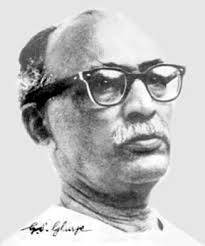Loading AI tools
Founder of Indian sociology (1893–1983) From Wikipedia, the free encyclopedia
Govind Sadashiv Ghurye (12 December 1893 – 28 December 1983) was a pioneering Indian academic who was a professor of sociology.[3] In 1924, he became the second person to head the Department of Sociology at the University of Bombay.[4] And, is widely regarded as the founder of Indian Sociology & Sociology in India.
G. S. Ghurye | |
|---|---|
 | |
| Born | 12 December 1893 Malvan, Bombay Presidency, British India |
| Died | 28 December 1983 (aged 90)[1] Bombay, Maharashtra, India[2] |
| Nationality | Indian |
| Citizenship | Indian (formerly British subject |
| Alma mater | University of Cambridge |
| Spouse | Sajubai Ghurye. |
| Scientific career | |
| Fields | Sociology, Anthropology |
| Institutions | University of Bombay |
| Doctoral advisor | W. H. R. Rivers & A. C. Haddon |
G S Ghurye was born, in a Saraswat Brahmin community[5] on 12 December 1893, at Malvan, in present-day Maharashtra.[2] His early schooling was at the Aryan Education Society's High School, Girgaum, in Bombay, and then at Bahadur Khanji High School, Junagadh, in the princely state of Junagadh.[2] He joined Bahauddin college at Junagarh, in 1912, but moved on to Elphinstone College, Bombay, after a year, and received his B. A. (Sanskrit) and M. A. (Sanskrit) degrees from there.[6] He earned the Bhau Daji prize with his B. A., and the Chancellor's gold medal with his M. A. degree.[6] After completing his M. A., Ghurye received a scholarship for further studies in England, and earned his PhD from Cambridge University in 1922.[2] Ghurye was deeply influenced by W. H. R. Rivers, who was his PhD guide.[7] After Rivers' untimely death in 1922, he completed his thesis under A. C. Haddon.[7]
Ghurye was married to Sajubai of Vengurla, a town near Malwan.[2] His son, Sudhish Ghurye is a Mathematician and Statistician, and daughter Kumud G. Ghurye was a barrister.[8]
Ghurye was appointed as Head of the Department of Sociology in Bombay University in 1924, and retired in 1959.[9] The department was founded by Patrick Geddes in 1919.[10] However, when Ghurye took it over, it was on the verge of closure. The department came alive once again with Ghurye, and now, Ghurye is regarded as the real founder[11] and "shaped" the study of sociology there from then on.[12]
He also founded the Indian Sociological Society and its newsletter, Sociological Bulletin, and served as head for both.[13] He also headed the Bombay Anthropological Society for some years.[14]
After retirement, he served as Professor Emeritus for Bombay University and at least three festschrifts were produced in his honour, of which two were during his lifetime.[15] He guided a total of 80 research theses and authored 32 books and a number of other papers.[16] Later, at least two theses were written on him.[17]
Among his students were personalities like noted social reformer and intellectual Dr. Uttamrao K. Jadhav,[18] A. J. Agarkar, Y. M. Rege, L. N. Chapekar, M. G. Kulkarni, M. S. A. Rao, Iravati Karve, C. Rajagopalan, Y. B. Damle, M.N. Srinivas, A. R. Desai, D. Narain, I. P. Desai, M. S. Gore, Suma Chitnis and Victor D'Souza.[19] He also had the opportunity to see the "Dr. G. S. Ghurye Award" being instituted in his honour.[20] His book Caste and race in India is regarded as a classic in the field.[21]
Seamless Wikipedia browsing. On steroids.
Every time you click a link to Wikipedia, Wiktionary or Wikiquote in your browser's search results, it will show the modern Wikiwand interface.
Wikiwand extension is a five stars, simple, with minimum permission required to keep your browsing private, safe and transparent.